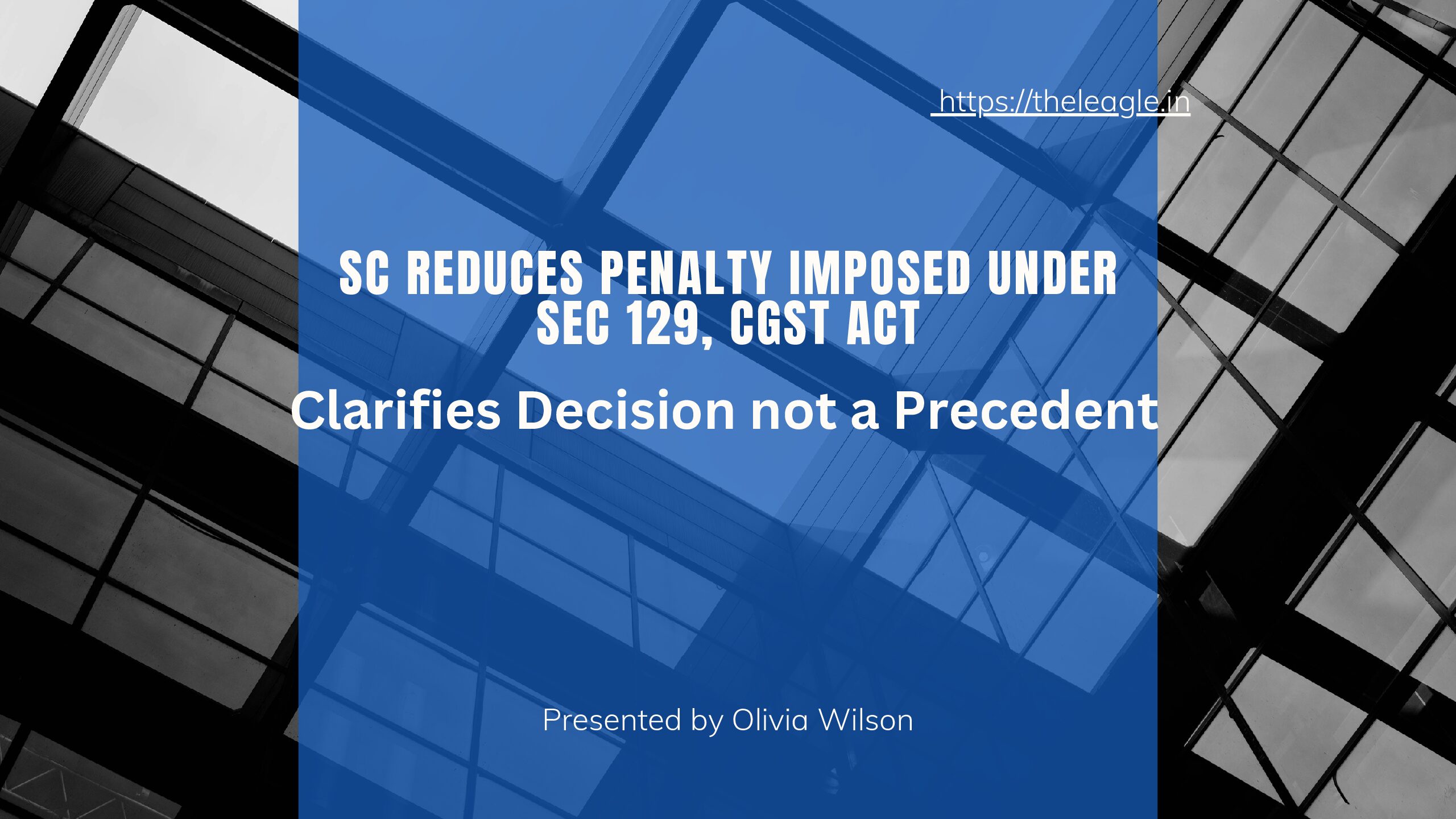Supreme Court in a recent case[1], directed that the penalty imposed on the assessee for transporting goods without a valid e-way bill should be reduced by 50%. While the Calcutta High Court had upheld the levy of penalty, the Supreme Court to serve ‘ the ends of justice’ reduced the penalty amount by half, without articulating any convincing reason for its conclusion and stated that its order in the impugned case should not be treated as a precedent.
Facts
The brief facts of the case are: the assessee was in the business of horizontal drilling in underground utilities and availed the services of M/s Hariom Freight Carriers for transportation of one its machines weighing 68 tons from its previous work site in Uttar Pradesh to West Bengal. The e-way bill for transportation was generated on 30 May 2019, and it was valid until 9 June 2019. The transportation was not done within the validity period and the vehicle was intercepted on 17 June 2019 and was found carrying goods without a valid e-way bill. Accordingly, the assessee was issued a notice as to why it should not pay a tax of Rs 54,00,000 and a penalty of equivalent amount. The said amount was confirmed against which the assessee filed an appeal. The assessee deposited 10% of the tax demand and furnished a bank guarantee of the amount of demand to secure release of its machine. However, the appeal was not decided and the Calcutta High Court directed that the appeal be decided. Eventually, the High Court ordered that the tax be paid in cash, 50% of the penalty amount be paid in cash and the remaining 50% of the penalty amount be paid by furnishing a bank guarantee which should be valid for 1 year. Against the said order, the assessee approached the Supreme Court.
Arguments and Decision
The assessee’s arguments before the Supreme Court centred around reduction of the penalty amount. The assessee argued that the imposition of such a heavy penalty would lead to financial hardship for it. The assessee had no justifiable reason for not generating another e-way bill after expiry of the first one. The assessee could only suggest that M/s Hariom Freight Carriers did not have another vehicle available for transportation and it did not inform the assessee about it, which led to transportation of the machine accompanied by an expired e-way bill. The assessee also added that the transaction in question was not a sale/purchase but merely the transport of its capital goods from one place to another and the entire set of circumstances should be taken cognizance of to reduce its penalty.
The Revenue Department, on the other hand, defended the imposition of penalty by clearly and cogently arguing that the assessee had no valid reason for not carrying a valid e-way bill and in the absence of a valid e-way bill, it was completely justified to levy a tax and penalty on the assessee. The Revenue Department added that there was a gap of 10 days between expiry of e-way bill and interception of the transport, and the assessee should have been more vigilant. And if another vehicle was not available, then the assessee should not have agreed to transport the machine without a valid e-way bill.
The Supreme Court referred to three distinct facts: first, an e-way bill was generated by the assessee, even if goods were transported after it had expired; second, the fact that the machine was being transported for use of the assessee itself, but in another place and there was no sale/purchase involved; third, that the penalty of a huge amount of Rs 54,00,000 was imposed on the assessee. The Court said that while it would not have ordinarily interfered, ‘the ends of justice’ would be served if the penalty amount is reduced by 50%. And concluded its order by clarifying that the order was passed under Article 142 of the Constitution and should not be treated as a precedent.
Conclusion
Ordinarily, one would not quibble if a Court intervenes to reduce the penalty imposed on an assessee if it in the opinion of the Court the penalty is unjust or harsh. However, in such scenarios the onerous nature of the penalty should be obvious. In the impugned case, while the penalty amount was certainly on the higher side, it is difficult to see how the assessee was not at fault. It was negligent behaviour on assessee’s part for allowing goods to be transported on an e-way bill that had expired 10 days before the vehicle was intercepted. While the fact that a penalty may impose financial hardship is an acceptable reason for reducing the quantum of penalty, the assessee’s conduct, in my opinion, did not merit the leniency shown by the Supreme Court.
[1] Vardan Associates Pvt Ltd v Assistant Commissioner of State Tax, Central Section & Ors TS-692-SC-2023-GST.
